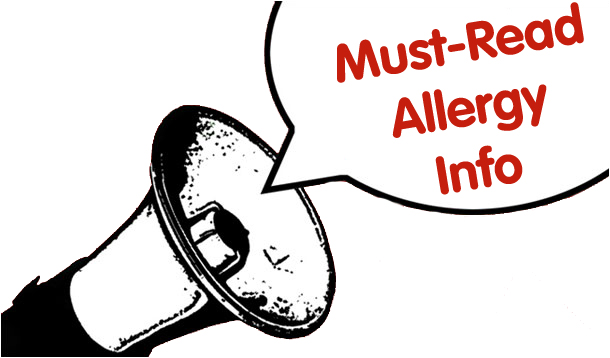
When Adam was a toddler, he was diagnosed as having severe allergies to all nuts, eggs, shellfish, wheat, dairy, and strawberries. That was the day carrying an EpiPen (epinephrine auto-injector), reading food labels, asking about ingredients, and always being vigilant about the food he came into contact with became a part of our lives.
At the age of eight, Adam had a blood test done at his allergist's office and it showed he was possibly no longer allergic to eggs and peanuts. Our allergist suggested we wait a few months then bring him in to do a food allergy challenge. We would start with eggs.
The test would consist of us bringing cooked scrambled eggs to the allergist’s office. We would start off by putting a small amount of the egg on his cheek and waiting 20 minutes to see if there was a reaction. Next we would put a small amount on his lip and wait another 20 minutes for a reaction. The egg would then go on the inside of his lip, then his tongue. The format of the test would continue this way until he gradually consumed small amounts of egg, increasing the amount every 20 minutes.
We were ecstatic. No longer severely allergic to peanuts and eggs? We felt like we had won the lottery. I couldn’t get him to the allergist’s office fast enough.
This is where we learned a huge lesson.
The testing didn’t go well. Simply put, he refused to eat the eggs because he thought if he ate them he would die.
For over six years we had been telling Adam that eating peanuts or eggs was dangerous. For six years we stressed to him the importance of always asking about the ingredients in food, to always read labels, and to always carry his EpiPen. He absolutely could not eat eggs or peanuts under any circumstance.
And now we were bringing him into an office and saying, “Hey, Adam! Eat some eggs!”
Of course it makes complete sense, but our excitement over the possibility of being able to eliminate these two foods from his list of allergies didn’t allow us to see it. Eventually we did do the food allergy challenge but the amount of stress it put on my son still leaves me filled with guilt to this day. So I want you to learn from my mistake.
It is so important to prepare your child for a trip to the allergist no matter what the circumstances. Going to an allergist can be a scary thing, especially when a child hears they are going to have their skin “pricked” or “scratched.”
But if your child is going to doctor’s office for a food allergy challenge, it is so important to prepare them for the experience.
This wasn’t a one-time conversation. We spoke to him over and over until the day of his appointment and let him know that his feelings are important, but this is also something he needed to do. We also gave him some control and allowed him to choose when we would go to do the challenge and what food he would eat to see if he was no longer allergic to peanuts.
We’re happy to say that Adam is no longer allergic to peanuts and eggs and anytime we visit his allergist or doctor we always inform him as to what will happen. Knowledge is power and that holds true for our children as well.
Note: NEVER do a food allergy challenge at home. Reintroducing foods should only be done under the supervision of a doctor.
 Severe allergies are on the rise in Canada.
Severe allergies are on the rise in Canada.
This is proudly sponsored by EpiPen®.
EpiPen.ca
The opinions expressed in this post are the opinions of the individual author and may not reflect the opinions of Pfizer Canada, the Canadian distributor of EpiPen. Pfizer Canada reviews all material to ensure medical accuracy of statements.
EpiPen® and EpiPen® Jr (epinephrine) Auto-Injectors are indicated for the emergency treatment of anaphylactic reactions in patients who are determined to be at increased risk for anaphylaxis, including individuals with a history of anaphylactic reactions. Selection of the appropriate dosage strength is determined according to patient body weight.
EpiPen® and EpiPen® Jr Auto-Injectors are designed as emergency supportive therapy only. They are not a replacement for subsequent medical or hospital care. After administration, patients should seek medical attention immediately or go to the emergency room. For the next 48 hours, patients must stay within close proximity to a healthcare facility or where they can call 911. To ensure this product is right for you, always read and follow the label. Please consult the Consumer Information leaflet in your product package for complete dosage and administration instructions.
© 2013 Pfizer Canada Inc., Kirkland, Quebec H9J 2M5 • Toll free: 1-877-EPIPEN1 (1-877-374-7361)
EpiPen®, EpiPen® Jr are registered trademarks of Mylan Inc. licensed exclusively to its wholly-owned affiliate, Mylan Specialty, L.P.; sub-licensee, Pfizer Canada Inc., Kirkland, Quebec H9J 2M5